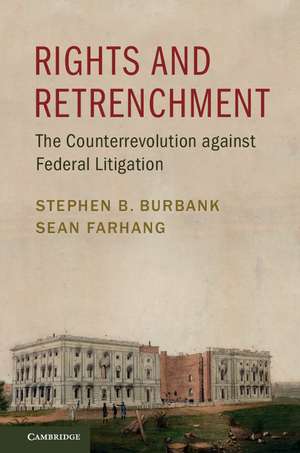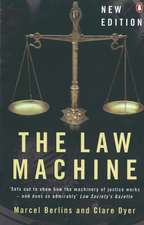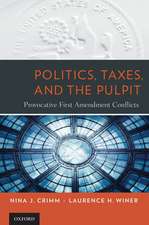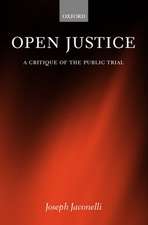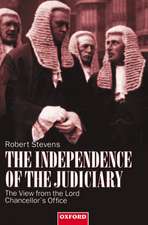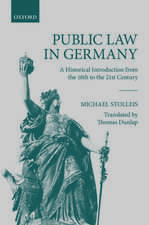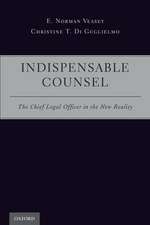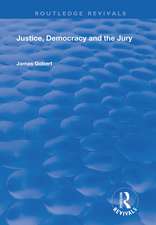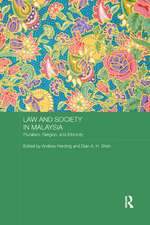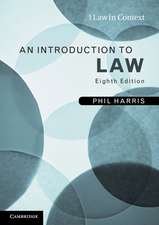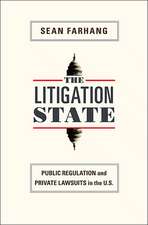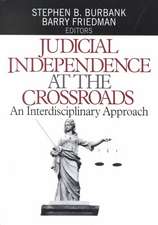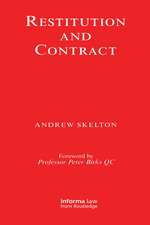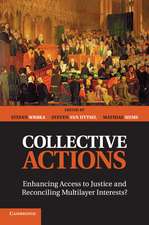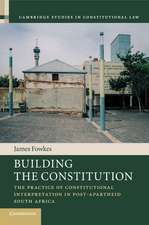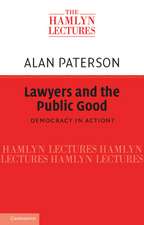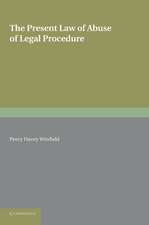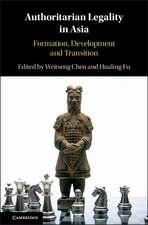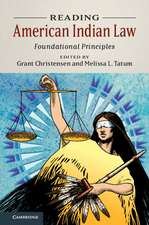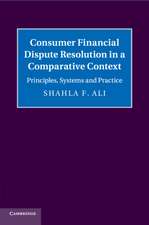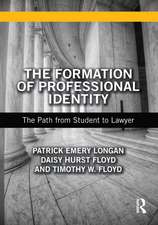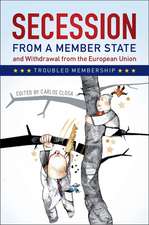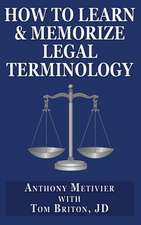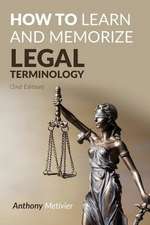Rights and Retrenchment: The Counterrevolution against Federal Litigation
Autor Stephen B. Burbank, Sean Farhangen Limba Engleză Paperback – 17 apr 2017
| Toate formatele și edițiile | Preț | Express |
|---|---|---|
| Paperback (1) | 305.71 lei 3-5 săpt. | |
| Cambridge University Press – 17 apr 2017 | 305.71 lei 3-5 săpt. | |
| Hardback (1) | 763.52 lei 6-8 săpt. | |
| Cambridge University Press – 17 apr 2017 | 763.52 lei 6-8 săpt. |
Preț: 305.71 lei
Nou
Puncte Express: 459
Preț estimativ în valută:
58.49€ • 61.08$ • 48.30£
58.49€ • 61.08$ • 48.30£
Carte disponibilă
Livrare economică 25 martie-08 aprilie
Preluare comenzi: 021 569.72.76
Specificații
ISBN-13: 9781316502044
ISBN-10: 131650204X
Pagini: 292
Dimensiuni: 152 x 229 x 12 mm
Greutate: 0.43 kg
Editura: Cambridge University Press
Colecția Cambridge University Press
Locul publicării:New York, United States
ISBN-10: 131650204X
Pagini: 292
Dimensiuni: 152 x 229 x 12 mm
Greutate: 0.43 kg
Editura: Cambridge University Press
Colecția Cambridge University Press
Locul publicării:New York, United States
Cuprins
1. Retrenching rights in institutional context: constraints and opportunities; 2. The legislative counterrevolution: emergence, growth, and disappointment; 3. The rulemaking counterrevolution: birth, reaction, and struggle; 4. The counterrevolution in the Supreme Court: succeeding; 5. The subterranean counterrevolution: the Supreme Court, the media, and public opinion; 6. Rights, retrenchment, and democratic governance.
Recenzii
'Rights and Retrenchment is a masterwork. Drawing on their path-breaking empirical research, Burbank and Farhang provide a revelatory analysis … This book is truly essential reading not only for political scientists and legal scholars but for anyone concerned about the future of the American regulatory state.' Robert A. Kagan, Professor Emeritus of Political Science and Law, University of California, Berkeley
'Rights and Retrenchment is a scholarly lightning bolt, mixing rigorous empiricism and close, institution-level analysis of civil rulemaking in a field that has too often lacked either. It's an instant classic in explaining how we got to the present while also charting a new path forward for procedure scholars.' David Freeman Engstrom, Bernard D. Bergreen Faculty Scholar, Stanford Law School, California
'Burbank and Farhang trace in detail how conservatives have sought to defang private enforcement of protections afforded by federal law … This book is essential reading for everyone interested in the state of twenty-first century politics in the United States.' Herbert Kritzer, Marvin J. Sonosky Chair of Law and Public Policy, University of Minnesota Law School
'Burbank and Farhang provide an outstanding exploration of the intersection of law and politics. They examine in rich detail the many ways conservatives have tried to limit private enforcement of federal laws … They use a variety of forms of evidence … to make a convincing argument about institutional support for retrenchment.' R. Shep Melnick, Tip O'Neill Professor, Boston College, Massachusetts
'This impressive new book demonstrates convincingly how private litigation in the courts is embedded in larger political contests over the scale and scope of federal rights … a must-read for anyone who wants to understand the complex politics and institutional dynamics surrounding private enforcement of federal law.' Margaret Lemos, Robert G. Seaks LL. B. '34 Professor of Law, Duke University, North Carolina
'In this elegant study, Stephen B. Burbank and Sean Farhang demonstrate that the Supreme Court has dramatically undercut enforcement of federal rights by making it harder for plaintiffs to sue in the first place. Rich in data, thoughtful and perceptive in analysis, this book is a landmark contribution to our understanding of the Supreme Court and the meaningful enforcement of federal rights.' Charles Epp, Distinguished Professor, University of Kansas
'Rights and Retrenchment is a scholarly lightning bolt, mixing rigorous empiricism and close, institution-level analysis of civil rulemaking in a field that has too often lacked either. It's an instant classic in explaining how we got to the present while also charting a new path forward for procedure scholars.' David Freeman Engstrom, Bernard D. Bergreen Faculty Scholar, Stanford Law School, California
'Burbank and Farhang trace in detail how conservatives have sought to defang private enforcement of protections afforded by federal law … This book is essential reading for everyone interested in the state of twenty-first century politics in the United States.' Herbert Kritzer, Marvin J. Sonosky Chair of Law and Public Policy, University of Minnesota Law School
'Burbank and Farhang provide an outstanding exploration of the intersection of law and politics. They examine in rich detail the many ways conservatives have tried to limit private enforcement of federal laws … They use a variety of forms of evidence … to make a convincing argument about institutional support for retrenchment.' R. Shep Melnick, Tip O'Neill Professor, Boston College, Massachusetts
'This impressive new book demonstrates convincingly how private litigation in the courts is embedded in larger political contests over the scale and scope of federal rights … a must-read for anyone who wants to understand the complex politics and institutional dynamics surrounding private enforcement of federal law.' Margaret Lemos, Robert G. Seaks LL. B. '34 Professor of Law, Duke University, North Carolina
'In this elegant study, Stephen B. Burbank and Sean Farhang demonstrate that the Supreme Court has dramatically undercut enforcement of federal rights by making it harder for plaintiffs to sue in the first place. Rich in data, thoughtful and perceptive in analysis, this book is a landmark contribution to our understanding of the Supreme Court and the meaningful enforcement of federal rights.' Charles Epp, Distinguished Professor, University of Kansas
Notă biografică
Descriere
This book shows how an increasingly conservative Supreme Court has undermined the enforcement of rights through strategies rejected by Congress.
